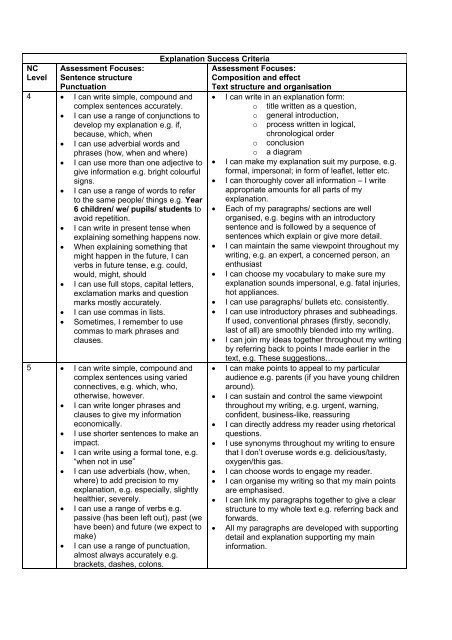Torbay Literacy Folio 10E Explanatory Texts Assessment Criteria ...
Torbay Literacy Folio 10E Explanatory Texts Assessment Criteria ...
Torbay Literacy Folio 10E Explanatory Texts Assessment Criteria ...
Create successful ePaper yourself
Turn your PDF publications into a flip-book with our unique Google optimized e-Paper software.
NC <strong>Assessment</strong> Focuses:<br />
Explanation Success <strong>Criteria</strong><br />
<strong>Assessment</strong> Focuses:<br />
Level Sentence structure<br />
Composition and effect<br />
Punctuation<br />
Text structure and organisation<br />
4 • I can write simple, compound and • I can write in an explanation form:<br />
complex sentences accurately.<br />
o title written as a question,<br />
• I can use a range of conjunctions to<br />
o general introduction,<br />
develop my explanation e.g. if,<br />
o process written in logical,<br />
because, which, when<br />
chronological order<br />
• I can use adverbial words and<br />
o conclusion<br />
phrases (how, when and where)<br />
o a diagram<br />
• I can use more than one adjective to • I can make my explanation suit my purpose, e.g.<br />
give information e.g. bright colourful formal, impersonal; in form of leaflet, letter etc.<br />
signs.<br />
• I can thoroughly cover all information – I write<br />
• I can use a range of words to refer appropriate amounts for all parts of my<br />
to the same people/ things e.g. Year explanation.<br />
6 children/ we/ pupils/ students to • Each of my paragraphs/ sections are well<br />
avoid repetition.<br />
organised, e.g. begins with an introductory<br />
• I can write in present tense when sentence and is followed by a sequence of<br />
explaining something happens now. sentences which explain or give more detail.<br />
• When explaining something that • I can maintain the same viewpoint throughout my<br />
might happen in the future, I can writing, e.g. an expert, a concerned person, an<br />
verbs in future tense, e.g. could, enthusiast<br />
would, might, should<br />
• I can choose my vocabulary to make sure my<br />
• I can use full stops, capital letters, explanation sounds impersonal, e.g. fatal injuries,<br />
exclamation marks and question hot appliances.<br />
marks mostly accurately.<br />
• I can use paragraphs/ bullets etc. consistently.<br />
• I can use commas in lists.<br />
• I can use introductory phrases and subheadings.<br />
• Sometimes, I remember to use<br />
If used, conventional phrases (firstly, secondly,<br />
commas to mark phrases and<br />
last of all) are smoothly blended into my writing.<br />
clauses.<br />
• I can join my ideas together throughout my writing<br />
by referring back to points I made earlier in the<br />
text, e.g. These suggestions…<br />
5 • I can write simple, compound and • I can make points to appeal to my particular<br />
complex sentences using varied audience e.g. parents (if you have young children<br />
connectives, e.g. which, who,<br />
around).<br />
otherwise, however.<br />
• I can sustain and control the same viewpoint<br />
• I can write longer phrases and<br />
throughout my writing, e.g. urgent, warning,<br />
clauses to give my information<br />
confident, business-like, reassuring<br />
economically.<br />
• I can directly address my reader using rhetorical<br />
• I use shorter sentences to make an questions.<br />
impact.<br />
• I use synonyms throughout my writing to ensure<br />
• I can write using a formal tone, e.g. that I don’t overuse words e.g. delicious/tasty,<br />
“when not in use”<br />
oxygen/this gas.<br />
• I can use adverbials (how, when, • I can choose words to engage my reader.<br />
where) to add precision to my • I can organise my writing so that my main points<br />
explanation, e.g. especially, slightly are emphasised.<br />
healthier, severely.<br />
• I can link my paragraphs together to give a clear<br />
• I can use a range of verbs e.g.<br />
structure to my whole text e.g. referring back and<br />
passive (has been left out), past (we forwards.<br />
have been) and future (we expect to • All my paragraphs are developed with supporting<br />
make)<br />
detail and explanation supporting my main<br />
• I can use a range of punctuation,<br />
almost always accurately e.g.<br />
brackets, dashes, colons.<br />
information.


